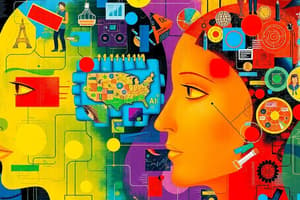Podcast
Questions and Answers
Which of the following represents a related research field in AI?
Which of the following represents a related research field in AI?
- Knowledge Representation (correct)
- Quantum Physics
- Genetic Engineering
- Psychology
What is one potential societal concern regarding AI?
What is one potential societal concern regarding AI?
- Enhanced human creativity
- Reduction of computational problems
- Increase in manual labor jobs
- Overdependence leading to unemployment (correct)
Which question addresses the capabilities of AI in comparison to human intelligence?
Which question addresses the capabilities of AI in comparison to human intelligence?
- Can AI replace cultural understanding?
- Can we make something that only follows commands?
- Can we make something that is as intelligent as a bee? (correct)
- Can AI help enhance manual skills?
Which of the following techniques is NOT a part of the pragmatic development of computer programs in AI?
Which of the following techniques is NOT a part of the pragmatic development of computer programs in AI?
What is a challenge in addressing AI problems?
What is a challenge in addressing AI problems?
What is a current limit of speech synthesis and recognition systems?
What is a current limit of speech synthesis and recognition systems?
Which application exemplifies the use of AI in language translation?
Which application exemplifies the use of AI in language translation?
Which scenario illustrates the constrained problems that AI systems are currently capable of solving?
Which scenario illustrates the constrained problems that AI systems are currently capable of solving?
In which area do AI techniques currently exhibit significant capabilities?
In which area do AI techniques currently exhibit significant capabilities?
What aspect of AI has been emphasized through the research direction of Bionics?
What aspect of AI has been emphasized through the research direction of Bionics?
Flashcards are hidden until you start studying
Study Notes
Speech Synthesis, Recognition, and Understanding
- Useful for applications with limited vocabulary.
- Challenges remain with unconstrained speech understanding.
Computer Vision
- Effective for constrained problems, such as reading hand-written zip codes.
- Difficulties persist in understanding natural, real-world scenes.
Learning
- Adaptive systems are implemented in various applications but have inherent limits.
Planning and Reasoning
- Successful in constrained environments, exemplified by games like chess.
- Complexity of real-world situations poses challenges for general systems.
Overall Insights
- Many components of intelligent systems are achievable.
- Numerous interesting research problems remain in the field.
AI Applications
- Language Translation: Google
- News Aggregation and Summarization: Google
- Speech Recognition: Nuance
- Song Recognition: Shazam
- Face Recognition: Recognizr
- Image Recognition: Google Goggles
- Question Answering: Apple Siri, IBM Watson
- Chess Playing: IBM Deep Blue
- 3D Scene Modeling: Microsoft Photosynth
- Driverless Cars: Companies like Google and Tesla
- Chatbots: Amy A.I.
- Augmented Reality Travel Guide: mTrip
State of AI Systems in Practice
- Email Communications: Email filters and smart replies.
- Social Media: Chatbots and proactive detection by Facebook.
- Web Searching: Predictive search by Google and algorithms used by YouTube.
- Stores and Services: Maps and directions, product recommendations by Amazon and Netflix, airline flights, banking, and digital voice assistants.
Current Capabilities in AI
- Playing a decent game of table tennis and bridge.
- Driving safely on varied road types.
- Online grocery purchases, including in-store options.
- Real-time translation and sustained conversation.
- Complex surgical operations and household tasks, such as unloading dishwashers.
Research Directions in AI
- Bionics: Human-focused approaches based on empirical research.
- Pragmatic Development: Rational approaches integrating mathematics and computer engineering.
Related Research Fields
- Knowledge Representation
- Reasoning and Automatic Proving
- Search and Optimization
- Problem Solving
- Learning and Understanding
- Pattern Classification and Recognition
- Planning
Societal Effects of AI
- Future implications of AI, including the risk of over-dependence leading to unemployment.
- Ethical considerations with AI in warfare, including autonomous weapon systems.
- Potential of AI to address unemployment and poverty while augmenting human intelligence.
Challenges and Questions in AI
- Potential to create human-level or bee-level intelligence.
- Development of self-improving, autonomous systems.
- Industry creation for handwriting recognition.
- Challenges in computation time, data information, and problem-solving complexity.
Notable Figures in AI
- Asimov, Clark, McCarthy, Minsky, Michie, Newell, Simon, Turing.
AI System Processes
- Demonstrating intelligence through effective communication.
- Capturing and preserving human expertise.
- Ability to reason, think critically, and respond quickly to large data sets.
Multi-Disciplinary Field of AI
- Foundations in Philosophy, Mathematics, Economics, Neuroscience, Psychology, Computer Engineering, Control Theory, Cybernetics, and Linguistics.
Foundations of AI
- Philosophy examines the nature of machine intelligence and knowledge.
- Psychology and Cognitive Science study human problem-solving.
- Neuroscience explores brain architecture.
- Computer Science focuses on algorithms, complexity theory, and programming languages.
- Mathematics and Physics contribute through statistical modeling and complex systems analysis.
Relevant Disciplines to AI
- Philosophy: Valid conclusions and knowledge acquisition.
- Mathematics/Statistics: Formal reasoning and uncertain information.
- Economics: Decision-making to maximize outcomes in competitive environments.
- Psychology: Exploration of human and animal cognition.
- Computer Science: Development of efficient computing systems.
- Linguistics: The relationship between language and thought.
Studying That Suits You
Use AI to generate personalized quizzes and flashcards to suit your learning preferences.




